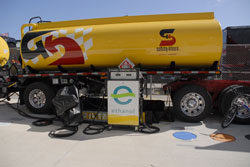 A study by a large over-the-road carrier supports the use of biodiesel.
A study by a large over-the-road carrier supports the use of biodiesel.
Iowa-based Decker Truck Line, Inc., with more than 700 semis out on the road and nine terminals in five states, is the first major trucking company to compare a soy biodiesel B20 blend to regular diesel in a comprehensive over-the-road test covering two million miles.
So far, 350,000 miles have been covered, and according to a National Biodiesel Board news release, so good:
“What we’ve observed so far is great performance in the particularly cold winter we just experienced, and reduced maintenance and engine wear benefits that equal or outweigh the slightly higher cost of the biodiesel blend,” [says Dale Decker, Industry & Government Relations Director for Decker Truck Line.]
In fact, Decker says they’ve observed cleaner engine oil, less engine wear, decreased maintenance, and good performance in cold weather as low as the single digits.
The National Biodiesel Board is happy with the results as well:
 “We are pleased that Decker Tuck Line has taken on this project to test biodiesel in real-world conditions,” said Tom Verry, Director of Outreach and Development for NBB. “This over-the-road study of biodiesel will help trucking companies and independent truckers gain a better understanding of the effect of biodiesel on their fleet.”
“We are pleased that Decker Tuck Line has taken on this project to test biodiesel in real-world conditions,” said Tom Verry, Director of Outreach and Development for NBB. “This over-the-road study of biodiesel will help trucking companies and independent truckers gain a better understanding of the effect of biodiesel on their fleet.”
Mileage and efficiency results of the study won’t be released until after the two million miles is completed.
 Last year at Indy races these only contained a blend of ethanol. This year the tanker’s packing true heat with 100% ethanol.
Last year at Indy races these only contained a blend of ethanol. This year the tanker’s packing true heat with 100% ethanol.

 Here’s Jeff Simmons posing with Scott Sharp (right) who drives the Rahal-Letterman Patron-sponsored car. I interviewed Scott during an open media session at Club Patron which is basically a mobile hospitality venue (Tequila bar). I think it’s interesting that Rahal has sponsors that create ethanol for fuel and for human consumption! I made sure I sampled and
Here’s Jeff Simmons posing with Scott Sharp (right) who drives the Rahal-Letterman Patron-sponsored car. I interviewed Scott during an open media session at Club Patron which is basically a mobile hospitality venue (Tequila bar). I think it’s interesting that Rahal has sponsors that create ethanol for fuel and for human consumption! I made sure I sampled and  It was a little noisy in Club Patron but I think you’ll enjoy hearing from Jeff. I asked him how it felt to be running on 100% ethanol this year and how his car’s performing. He thinks the time’s right for this fuel and very glad of all the support from the ethanol industry with the IRL.
It was a little noisy in Club Patron but I think you’ll enjoy hearing from Jeff. I asked him how it felt to be running on 100% ethanol this year and how his car’s performing. He thinks the time’s right for this fuel and very glad of all the support from the ethanol industry with the IRL.
 Here’s my workplace here in Homestead, FL at the Homestead/Miami Speedway. My little spot is right in front on the end of the table. It was the last place open when I got here yesterday.
Here’s my workplace here in Homestead, FL at the Homestead/Miami Speedway. My little spot is right in front on the end of the table. It was the last place open when I got here yesterday. The
The 
 It has been a hot sunny afternoon in south Florida. Fortunately the Indy cars get to do qualifying for race start position tonight under race time conditions since the XM Satellite Radio Indy 300 is a night race tomorrow.
It has been a hot sunny afternoon in south Florida. Fortunately the Indy cars get to do qualifying for race start position tonight under race time conditions since the XM Satellite Radio Indy 300 is a night race tomorrow. Well here we are just as the practice laps are completed at the Miami-Homestead Speedway the day before the XM Satellite Radio Indy 300. That’ll take place tomorrow evening at 8pm eastern time and you can see it on ESPN2.
Well here we are just as the practice laps are completed at the Miami-Homestead Speedway the day before the XM Satellite Radio Indy 300. That’ll take place tomorrow evening at 8pm eastern time and you can see it on ESPN2. At Soya & Oilseed Summit 2007: Nourishing Innovations in Food & Energy, industry thought leaders will discuss the dynamics that drive the industry today and into a future fraught with competing policies, technologies and needs, in a discussion and exploration of sound, rational solutions to the industry’s largest questions.
At Soya & Oilseed Summit 2007: Nourishing Innovations in Food & Energy, industry thought leaders will discuss the dynamics that drive the industry today and into a future fraught with competing policies, technologies and needs, in a discussion and exploration of sound, rational solutions to the industry’s largest questions. A study by a large over-the-road carrier supports the use of biodiesel.
A study by a large over-the-road carrier supports the use of biodiesel. “We are pleased that Decker Tuck Line has taken on this project to test biodiesel in real-world conditions,” said Tom Verry, Director of Outreach and Development for NBB. “This over-the-road study of biodiesel will help trucking companies and independent truckers gain a better understanding of the effect of biodiesel on their fleet.”
“We are pleased that Decker Tuck Line has taken on this project to test biodiesel in real-world conditions,” said Tom Verry, Director of Outreach and Development for NBB. “This over-the-road study of biodiesel will help trucking companies and independent truckers gain a better understanding of the effect of biodiesel on their fleet.” Biodiesel got a boost when diesel engine making giant Cummins approved 20% biodiesel for many of its engines.
Biodiesel got a boost when diesel engine making giant Cummins approved 20% biodiesel for many of its engines.  First, the American Society of Testing Materials specification ASTM D6751 now includes an important stability specification for B100 biodiesel. Second, the availability of quality fuels from BQ-9000 Certified Marketers and Accredited Producers is growing rapidly; and third, Cummins has completed the necessary testing and evaluations to ensure that customers can reliably operate their equipment with confidence using B20 fuel.
First, the American Society of Testing Materials specification ASTM D6751 now includes an important stability specification for B100 biodiesel. Second, the availability of quality fuels from BQ-9000 Certified Marketers and Accredited Producers is growing rapidly; and third, Cummins has completed the necessary testing and evaluations to ensure that customers can reliably operate their equipment with confidence using B20 fuel. “Cummins’ announcement is a major milestone for diesel equipment-maker acceptance of biodiesel,” said Steve Howell, National Biodiesel Board (NBB) Technical Director. “Cummins is among the leaders in the on-highway truck engine market. As knowledgeable consumers add ‘support for B20’ in their purchasing decisions for diesel vehicles, the smart companies are taking advantage of that and issuing B20 support as a way to capture this growing sentiment for using fuels we don’t have to import.”
“Cummins’ announcement is a major milestone for diesel equipment-maker acceptance of biodiesel,” said Steve Howell, National Biodiesel Board (NBB) Technical Director. “Cummins is among the leaders in the on-highway truck engine market. As knowledgeable consumers add ‘support for B20’ in their purchasing decisions for diesel vehicles, the smart companies are taking advantage of that and issuing B20 support as a way to capture this growing sentiment for using fuels we don’t have to import.”